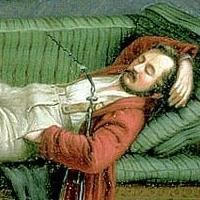The ninth episode of the first part of the novel by Ivan Alexandrovich Goncharov is the chapter “Oblomov’s Dream”. In it, a young landowner, recently over thirty years old, falls asleep in his untidy rented four-room St. Petersburg apartments, and in a dream there are scenes from his childhood. Nothing fantastic or far-fetched. Agree, in a dream it is rare when we see documentary in its purest form. Of course, this is an
artistic technique of the author. Oblomov’s dream is a kind of journey at a time when Ilya Ilyich was still a child surrounded by blind parental love.
Why did Goncharov choose such an unusual form of narration? The need for her presence in the novel is obvious. A young man, in his prime, at the age at which his peers achieved significant success in life, spends all days lying on the couch. Moreover, he does not feel any inner need to get up and do something. It was not by chance that Oblomov suddenly came to such an empty inner world and a mutilated personality. Oblomov’s dream - an analysis of those primary impressions and sensations of the boy Ilyusha, which later developed into beliefs, formed the very foundation, the foundation of his personality. Goncharov’s appeal to the childhood of his hero is no coincidence. It is childhood impressions, as you know, that bring to the life of a person either a constructive or destructive principle.
Oblomovka - serfdom of laziness

Oblomov’s dream begins with his seven-year stay in the parental estate, the village of Oblomovka. This little world is on the edge. The news does not reach here, there are practically no visitors with their troubles. Oblomov's parents come from an old noble family. A generation ago their home was one of the best in the county. Life was in full swing here. However, the blood gradually cooled in the veins of these landowners. There is no need to work, they decided, three hundred and fifty serfs would still bring income. Why strain, if life will still be well-fed and comfortable. This generic laziness, when the only concern of the whole family before dinner was its preparation, and after it the whole lord's house fell into a slumber, like an illness, was transmitted to Ilyusha. Surrounded by a host of nannies in a hurry to fulfill any wish of the child, without even letting him get up from the couch, the lively and active child absorbed an aversion to work and even fun with his peers. He gradually became lethargic and lethargic.
Pointless flight on the wings of fantasy
Then Oblomov’s dream transferred him at the moment when the nanny read him fairy tales. Laid deep inside the creative potential of the child found a way out. However, this exit was peculiar: from the perception of fabulous Pushkin images to their further transfer into your dreams. Oblomov’s dream indicates to us the fact that Ilyusha perceived the stories differently than other children who, having heard a fairy tale, begin to actively beat with their peers. He played differently: when he heard a fairy tale, he immersed its heroes in his dream in order to virtually perform feats and noble deeds with them. He did not need peers; he did not need to participate in anything. Gradually, the world of dreams replaced the real desires and aspirations of the boy. He was weak, any work began to seem boring to him, unworthy of his attention. Work, Oblomov believed, was for the serfs Vanek da Zaharok.
School that has not changed life position
Oblomov’s dream immersed him in his school years, where he, along with his peer Andryusha Stoltz, taught him the course of primary school. Studying took place in the neighboring village, Verkhlev. Ilyusha Oblomov at that time was a boy of about fourteen, plump and passive. It would seem that next to him he saw the father and son of the Stoltz people, active, active. It was a chance for Oblomov to change his outlook on life. However, this did not happen, unfortunately. Suppressed by serfdom, one village turned out to be similar to another. In exactly the same way as in Oblomovka, laziness flourished here. People were in a passive, drowsy state. “The world does not live like the Stolts,” Ilyusha decided and remained lazy.
Conclusion
From the point of view of literary scholars, the episode of sleep is key in the novel by I. A. Goncharov “Oblomov”. He showed the origins of the character formation of a literary hero, whose name has long been a household name.